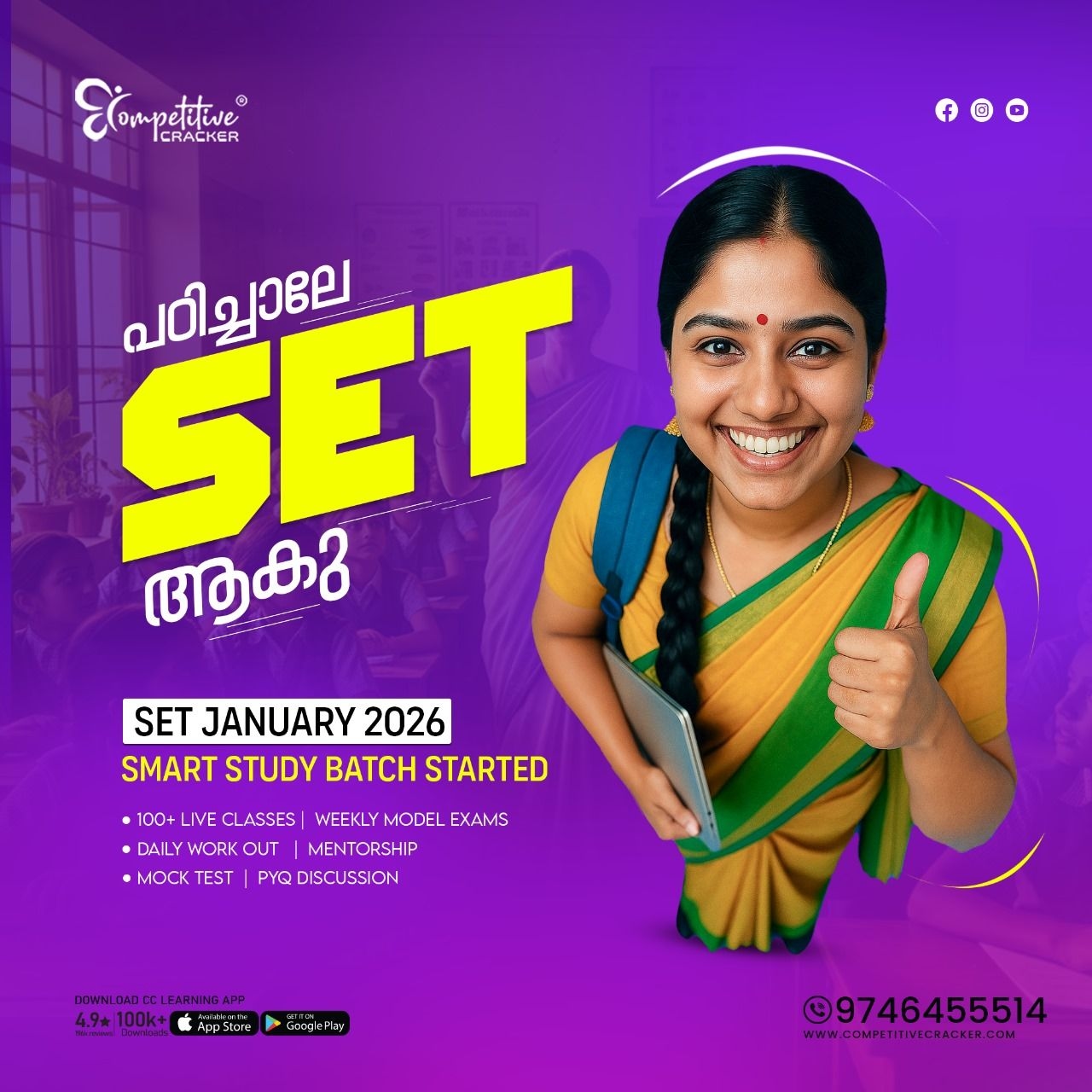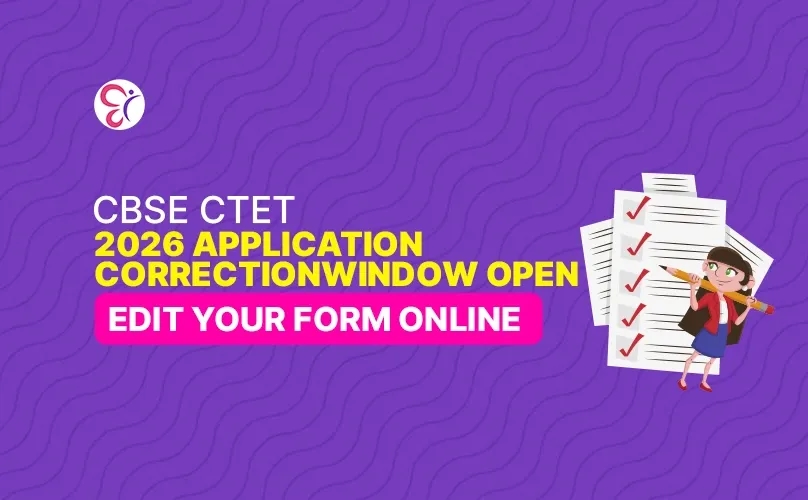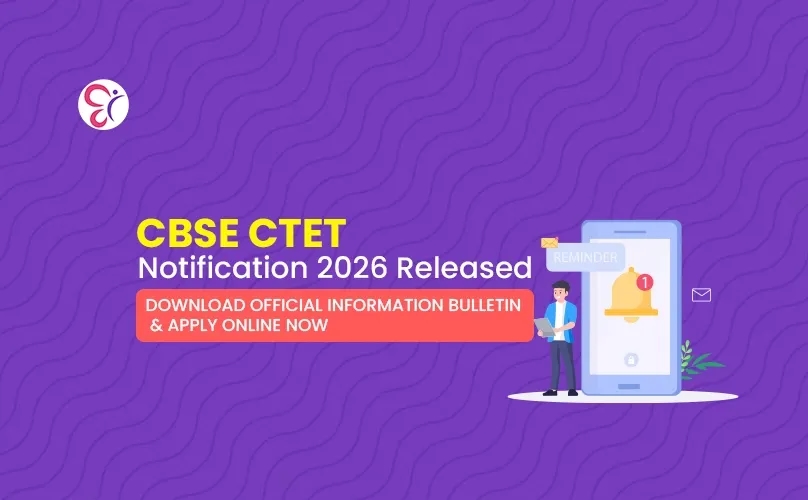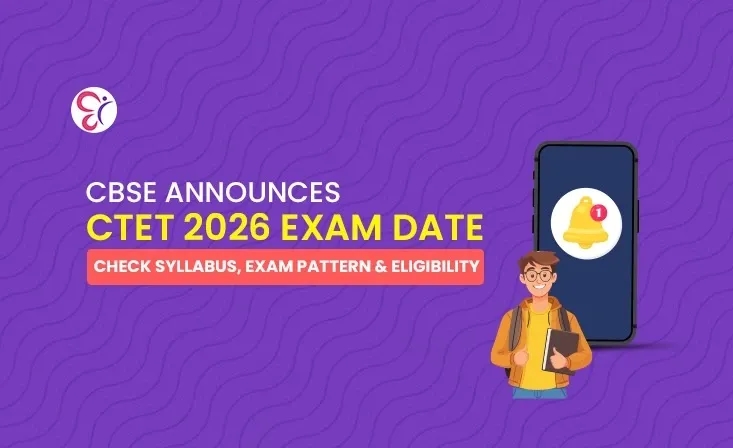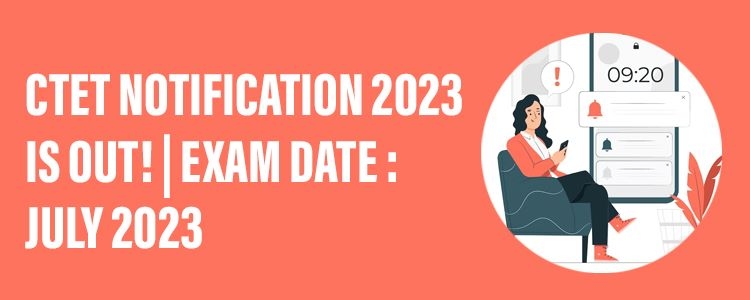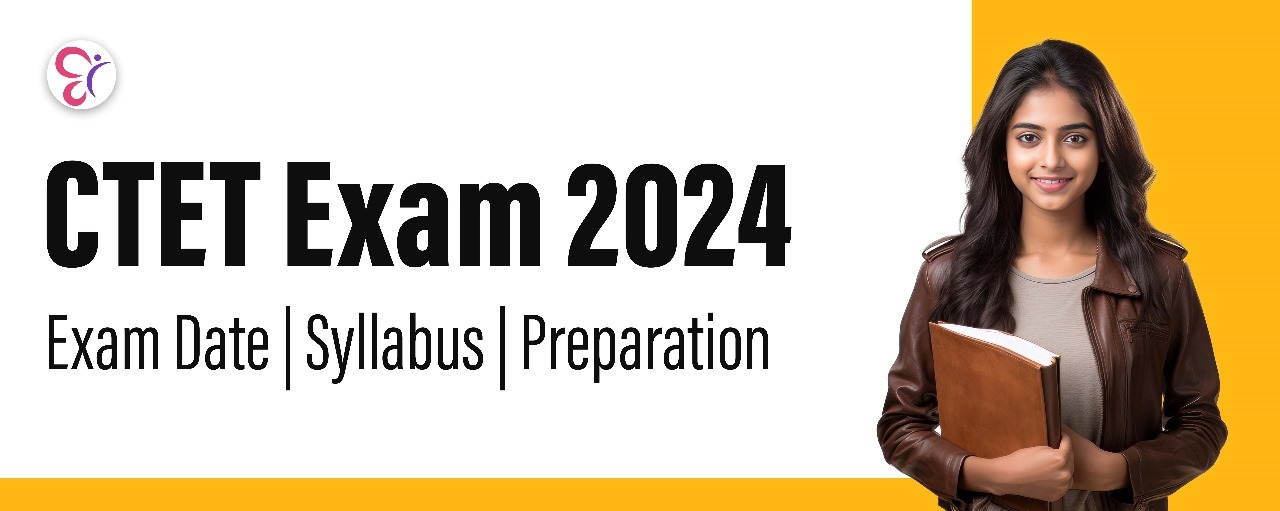CTET 2024, Notification Out, Exam Date
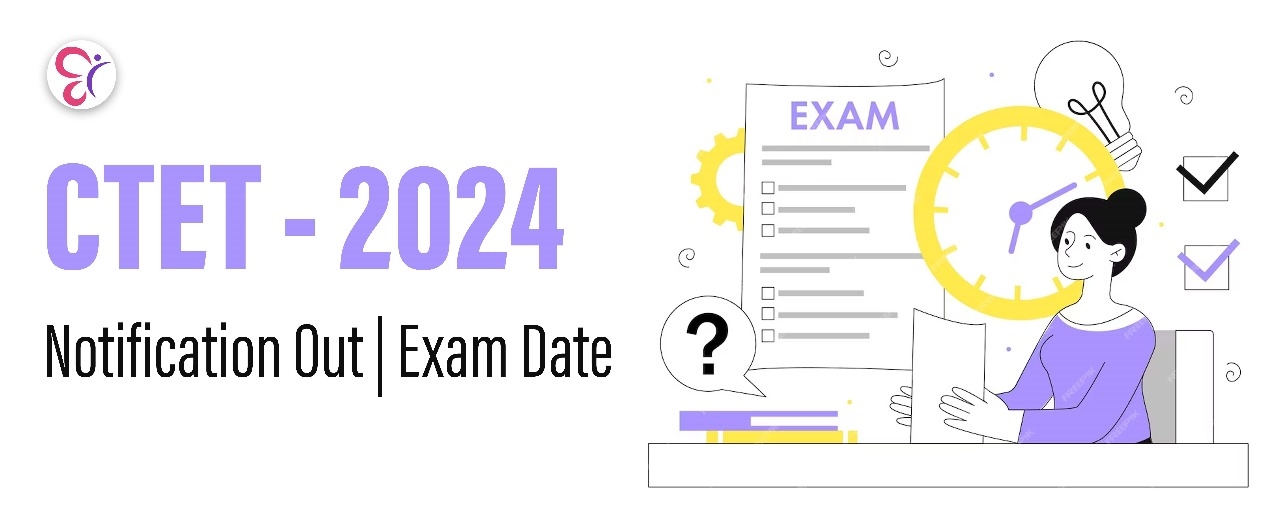
Table of Contents
CTET 2024 Notification
CTET 2024 Exam date.
CTET 2024 Registration
CTET Eligibility 2024
CTET Admission Card 2024
CTET 2024 Exam Pattern
CTET 2024 Syllabus
CTET 2024 Notification
The Central Board of Secondary Education is set to conduct the 19th edition of the Central Teacher Eligibility Test (CTET). CTET is available in twenty languages across 136 cities. The detailed information Bulletin is available on the CTET official website. Candidates are advised to download it and read it carefully before applying. The date for online application starts on 7th March, 2024 and ends on 2nd April, 2024. Join the best online coaching platform for CTET. Brighten up your dreams of becoming a certified primary school teacher and become eligible to be appointed teachers in various government and individual schools.
CTET 2024 Exam date.
The exam date of CTET 2024 is scheduled and mentioned in the official notification as 7th July, 2024. CTET Paper 2 will be on the morning session i.e. 9:30 am – 12:00 pm and CTET Paper 1 will be at 2:00 pm to 4:30 pm. Both papers as per the official CTET exam schedule will be on the same day and the time duration allowed for each exam will be 2:30 hours.
CTET 2024 Registration
The Central Teacher Eligibility Test (CTET) can be applied online on the CTET official website from 7th March, 2024 to 2nd April, 2024. Candidates are advised to read the Information Bulletin, satisfy eligibility, submit their application before the last date to apply. Candidate submitting multiple applications will lead to the cancellation of candidature and debarment in future examinations. The CTET 2024 registration process involves logging on to the official website, filling in the application form. Candidates must upload a scanned image of their latest photograph and signature. Both the images should be JPG/JPEG format. The fee payment only through debit/credit card or net banking is accepted. CTET Exam fee can be paid by means of Credit Card, Debit Card or Net Banking. Applicant should make sure that the payment process has been complete and successful. Any other means of payment will be considered invalid.
CTET Eligibility 2024
The eligibility criteria for CTET exam is set as per the framework done by National Council for Teacher Education (NCTE). Regulations and the Recruitment Rules of the respective institutions of Government or Kendriya Vidyalaya Sangthan or Navodaya Vidyalaya Samiti shall be considered as valid eligibility. Candidates can view and download the minimum qualifications of teachers as compiled by NCTE in its official website.
CTET Admission Card 2024
Admission card for CTET 2024 will be available in CTET official site. Candidates are advised to check the site regularly to get the important CTET news and updates. Once the admission card is issued all candidates should download and take printout of the same. Only candidates who are able to present the valid admission cards will be permitted to attend the exam. The details of exam centre will be mentioned in the admission card.
CTET 2024 Exam Pattern
CTET is a national level test with all questions are of Multiple-Choice type. The test consists of two papers: those who aims for the certification of classes 1 to 5 has to attend only Paper I and candidates aiming for the certification for classes 6 – 8 should appear for Paper II also. Each paper carries 150 marks in total and no negative marking.
|
CTET Paper I Mark Distribution | |
|
Subject |
Marks |
|
Child Development and Pedagogy(compulsory) |
30 |
|
Mathematics (compulsory) |
30 |
|
Environmental Studies (compulsory) |
30 |
|
Language I(compulsory) |
30 |
|
Language II(compulsory) |
30 |
|
Total |
150 |
Each of the above-mentioned topic will comprise 30 questions. Each correct answer will be awarded 1 mark. And all the subjects are compulsory. The Child Development and Pedagogy topics focuses on educational psychology for students in 6-11 age category. Understanding about learner’s diverse needs and interactions, and facilitating learning will be tested with questions from this topic. Language I test will examine proficiency related to medium of instruction. And Language II test will focus on language, communication, and comprehension abilities Candidates can choose 2 languages of their choice from the list of languages provided. Also carefully note that Language I and Language II cannot be the same. Mathematics and Environmental Studies topics will examine concepts, problem-solving abilities, and pedagogical understanding. Test items will be evenly distributed across different sections of the syllabus prescribed by the NCERT for classes I-V.
|
CTET Paper II Mark Distribution | |
|
Subject |
Marks |
|
Child Development and Pedagogy(compulsory) |
30 |
|
Language I(compulsory) |
30 |
|
Language II(compulsory) |
30 |
|
Mathematics and Science (for Mathematics and Science teacher) |
- |
|
OR Social Studies/Social Science (for Social Studies/Social Science teacher) |
60 |
|
Total |
150 |
The Child Development and Pedagogy topic in CTET Paper 2 will focus on psychological aspects of teaching and learning for students in 11-14-year-old category., understanding diverse learners' characteristics, needs, and psychology, interaction with learners, and the qualities of a good facilitator. Candidates can choose either of the following topics according to their eligibility.
- Mathematics and Science
OR
- Social Studies / Social Science
Paper II tests will be based on topics prescribed by the NCERT syllabus for classes VI-VIII, with difficulty standards up to the Senior Secondary stage.
The list of languages are as follows:
|
CTET Language & Codes | |||
|
Language |
Code No |
Language |
Code No |
|
English |
01 |
Marathi |
11 |
|
Hindi |
02 |
Mizo |
12 |
|
Assamese |
03 |
Nepal |
13 |
|
Bengali |
04 |
Odia |
14 |
|
Garo |
05 |
Punjab |
15 |
|
Gujarati |
06 |
Sanskrit |
16 |
|
Kannada |
07 |
Tamil |
17 |
|
Khasi |
08 |
Telugu |
18 |
|
Malayalam |
09 |
Tibetan |
19 |
|
Manipuri |
10 |
Urdu |
20 |
CTET 2024 Syllabus
CTET 2024 syllabus and indeed put a tough test for the candidates. Completing the topics mentioned in the syllabus within the limited period of time is rather challenging. Joining the best CTET online coaching can be effective. With well-structured learning and a proper access to apt resources anyone can achieve the CTET certification. With the outstanding results produced in various TETs Competitive Cracker remains as the best online coaching platform for Teacher’s Eligibility Tests.
Paper I (for classes 1 to V) Primary Stage
- Child Development and Pedagogy (30 Questions)
- Child Development (Primary School Child) (15 Questions)
- Concept of development and its relationship with learning
- Principles of the development of children
- Influence of Heredity& Environment
- Socialization processes: Social world & children (Teacher, Parents, Peers)
- Piaget, Kohlberg and Vygotsky: constructs and critical perspectives
- Concepts of child-cantered and progressive education
- Critical perspective of the construct of Intelligence
- Multi-Dimensional Intelligence
- Language & Thought
- Gender as a social construct; gender roles, gender -bias and educational practice.
- Individual differences among learners, understanding differences based on diversity of language, caste, gender, community, religion etc.
- Distinction between Assessment for learning and assessment of learning; School-Based Assessment, Continuous & Comprehensive Evaluation: perspective and practice
- Formulating appropriate questions for assessing readiness levels of learners; for enhancing learning and critical thinking in the classroom and for assessing learner achievement.
- Concept of Inclusive education and understanding children with special needs (5 Questions)
- Addressing learners from diverse back grounds including disadvantaged and deprived
- Addressing the needs of children with learning difficulties, “impairment” etc.
- Addressing the Talented, Creative, Specially baled Learners
- Learning and Pedagogy (10 Questions)
- How children think and learn; how and why children “fail” to achieve success in school performance.
- Basic processes of teaching and learning; children’s strategies of learning; learning as asocial activity; social context of learning.
- Child as a problem solver and a “scientific investigator”
- Alternative conceptions of learning in children, understanding children’s “errors” as significant steps in the learning process.
- Cognition & Emotions
- Motivation and learning
- Factors contributing to learning-personal& environmental
- Mathematics 30 Questions
- Content (15 Questions)
- Geometry
- Shapes & Spatial Understanding
- Solids around Us
- Numbers
- Addition and Subtraction
- Multiplication
- Division
- Measurement
- Weight
- Time
- Volume
- Data Handling
- Patterns
- Money
- Pedagogical issues 15 Questions
- Nature of Mathematics/ Logical thinking; understanding children’s thinking and reasoning patterns and strategies of making meaning and learning
- Place of Mathematics in Curriculum
- Language of Mathematics
- Community Mathematics
- Evaluation through formal and informal methods
- Problems of Teaching
- Error analysis and related aspects of learning and teaching
- Diagnostic and Remedial Teaching
- Environmental Studies 30 Questions
- Content 15 Questions.
- Family and Friends: Relationships
- Work and Play
- Animals
- Plants
- Food
- Shelter
- Water
- Travel
- Things We Make and Do
- Pedagogical Issues 15 Questions
- Concept and scope of EVS
- Significance of EVS, integrated EVS
- Environmental Studies & Environmental Education
- Learning Principles
- Scope & relation to Science & Social Science
- Approaches of presenting concepts
- Activities
- Experimentation/Practical Work
- Discussion
- CCE
- Teaching material/Aids
- Problems
- Language I 30 Questions
- Language Comprehension 15 Questions
- Reading unseen passages - two passages one prose or drama and one poem with questions on comprehension, inference, grammar and verbal ability (Prose passage may be literary, scientific, narrative or discursive)
- Pedagogy of Language Development 15 Questions
- Learning and acquisition
- Principles of language Teaching
- Role of listening and speaking; function of language and how children use it as a tool
- Critical perspective on the role of grammar in learning a language for communicating ideas verbally and in written form
- Challenges of teaching language in a diverse classroom; language difficulties, errors and disorders
- Language Skills
- Evaluating language comprehension and proficiency: speaking, listening, reading and writing
- Teaching-learning materials: Textbook, multi-media materials, multi lingual resource of the classroom
- Remedial Teaching
- Language-II 30 Questions
- Comprehension 15 Questions
- Two unseen prose passages (discursive or literary or narrative or scientific) with question on comprehension, grammar and verbal ability
- Pedagogy of Language Development 15 Questions
- Learning and acquisition
- Principles of language Teaching
- Role of listening and speaking; function of language and how children use it as a tool
- Critical perspective on the role of grammar in learning a language for communicating ideas verbally and in written form;
- Challenges of teaching language in a diverse classroom; language difficulties, errors and disorders
- Language Skills
- Evaluating language comprehension and proficiency: speaking, listening, reading and writing
- Teaching - learning materials: Textbook, multi-media materials, multilingual resource of the classroom
- Remedial Teaching
- Comprehension 15 Questions
Trending Updates
